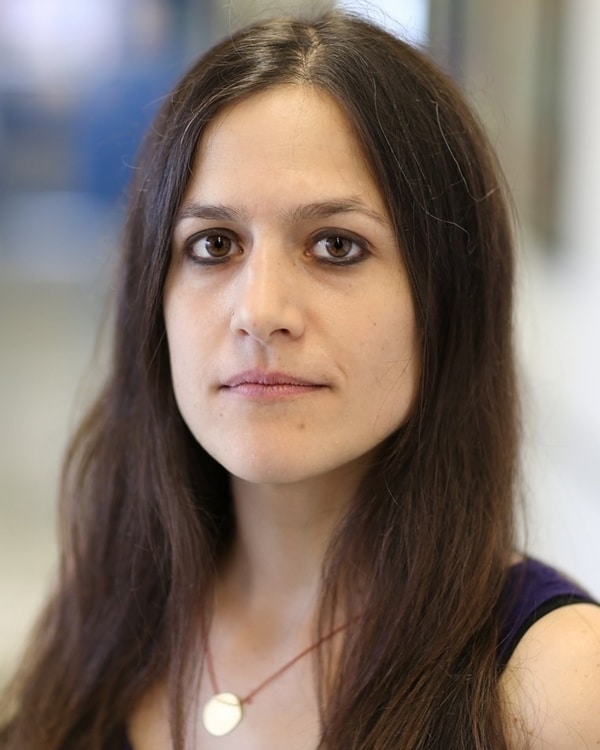- Assistant Professor, Ayata Lab
Pinar Ayata, Ph.D.
Dr. Ayata’s research focuses on the role that specialized microglia subpopulations play in mediating environmental effects on brain aging, with a specific focus on Alzheimer’s disease (AD). Microglia, the brain’s primary immune cells, have been implicated as the major causal cell type in AD. Based on recent data, indicating that epigenetic regulation in microglia is a primary driver of sporadic AD, her research aims to understand how the environment regulates the epigenetic landscape of microglia, and how these mechanisms influence neurodegeneration.
Dr. Ayata was born and raised in Istanbul. While continuing her undergraduate studies in Turkey, she did summer internships in German Cancer Research Center and Harvard Medical School. Her graduate work in the laboratory of Dr. Nathaniel Heintz at The Rockefeller University shed light on the interaction of 5-hydroxymethylcytosine modification and MeCP2 protein, and the pathophysiology of Rett syndrome. Her postdoctoral work in the laboratory of Dr. Anne Schaefer at Icahn School of Medicine at Mount Sinai unraveled cerebellar microglia as a subtype of microglia that functionally specialize in the phagocytic clearance of apoptotic neurons. She pinpointed the epigenetic mechanism that maintains microglial subtype specification and showed that it is crucial for normal brain function. Dr. Ayata’s recent work focuses on epigenetic mechanisms regulating functional specification of microglia in AD. She is the recipient of Women and Science Graduate Fellow Award, Rockefeller University Graduate Fellowship, NARSAD Young Investigator Award, and Robin Chemers Neustein Postdoctoral Award.
Publications
| Title |
|---|
A. Flury, L. Aljayousi, S. Aziz, H.-J. Park, M. Khakpour, C. Sandberg, F. G. Ibáñez, O. Braniff, P. Deme, J. D. McGrath, T. Ngo, J. Mechler, D. M. Ramirez, D. Avnon-Klein, J. W. Murray, J. Liu, N. J. Haughey, S. Werneburg, M.-È. Tremblay, P. Ayata. Integrated Stress Response Associated with Dark Microglia Promotes Microglial Lipogenesis and Contributes to Neurodegeneration. preprint. |
T. E. Faust, Y.-H. Lee, C. D. O’Connor, M. A. Boyle, G. Gunner, A. Badimon, P. Ayata, A. Schaefer, D. P. Schafer. Microglia-Astrocyte Crosstalk Regulates Synapse Remodeling via Wnt Signaling. preprint. . |
W. T. Ralvenius, A. E. Mungenast, H. Woolf, M. M. Huston, T. Z. Gillingham, S. K. Godin, J. Penney, H. P. Cam, F. Gao, C. G. Fernandez, B. Czako, Y. Lightfoot, W. J. Ray, A. Beckmann, A. M. Goate, E. Marcora, C. Romero-Molina, P. Ayata, A. Schaefer, E. Gjoneska, et al. A Novel Molecular Class That Recruits HDAC/MECP2 Complexes to PU.1 Motifs Reduces Neuroinflammation. Journal of Experimental Medicine, 2023, 220 (11), e20222105. DOI: https://doi.org/10.1084/jem.20222105. |
P. Ayata, I. Amit, C. M. Cuda. Editorial: Microglia in Neuroinflammation. Front. Immunol., 2023, 14, 1227095. DOI: https://doi.org/10.3389/fimmu.2023.1227095.
|
A. Badimon, H. J. Strasburger, P. Ayata, X. Chen, A. Nair, A. Ikegami, P. Hwang, A. T. Chan, S. M. Graves, J. O. Uweru, C. Ledderose, M. G. Kutlu, M. A. Wheeler, A. Kahan, M. Ishikawa, Y.-C. Wang, Y.-H. E. Loh, J. X. Jiang, D. J. Surmeier, S. C. Robson, et al. Negative Feedback Control of Neuronal Activity by Microglia. Nature, 2020, 586 (7829), 417–423. DOI: https://doi.org/10.1038/s41586-020-2777-8. |
S. L. Lim, C. J. Rodriguez-Ortiz, H.-W. Hsu, J. Wu, J. Zumkehr, J. Kilian, J. Vidal, P. Ayata, M. Kitazawa. Chronic Copper Exposure Directs Microglia towards Degenerative Expression Signatures in Wild-Type and J20 Mouse Model of Alzheimer’s Disease. Journal of Trace Elements in Medicine and Biology, 2020, 62, 126578. DOI: https://doi.org/10.1016/j.jtemb.2020.126578. |
P. Ayata, A. Schaefer. Innate Sensing of Mechanical Properties of Brain Tissue by Microglia. Current Opinion in Immunology, 2020, 62, 123–130. DOI: https://doi.org/10.1016/j.coi.2020.01.003. |
P. Shrestha, P. Ayata*, P. Herrero-Vidal, F. Longo, A. Gastone, J. E. LeDoux, N. Heintz, E. Klann. Cell-Type-Specific Drug-Inducible Protein Synthesis Inhibition Demonstrates That Memory Consolidation Requires Rapid Neuronal Translation. Nat Neurosci, 2020, 23 (2), 281–292. DOI: https://doi.org/10.1038/s41593-019-0568-z. (* co-first author) |
V. Kana, F. A. Desland, M. Casanova-Acebes, P. Ayata, A. Badimon, E. Nabel, K. Yamamuro, M. Sneeboer, I.-L. Tan, M. E. Flanigan, S. A. Rose, C. Chang, A. Leader, H. Le Bourhis, E. S. Sweet, N. Tung, A. Wroblewska, Y. Lavin, P. See, A. Baccarini, et al. CSF-1 Controls Cerebellar Microglia and Is Required for Motor Function and Social Interaction. Journal of Experimental Medicine, 2019, 216 (10), 2265–2281. DOI: https://doi.org/10.1084/jem.20182037. |
P. Shrestha, P. Ayata*, P. Herrero-Vidal, A. Gastone, JE LeDoux, N. Heintz, E. Klann. Chemogenetic evidence that rapid neuronal de novo protein synthesis is required for consolidation of long-term memory. bioRxiv. 2019 704965 (* co-first author) |
G. Gunner, L. Cheadle, K. M. Johnson, P. Ayata, A. Badimon, E. Mondo, M. A. Nagy, L. Liu, S. M. Bemiller, K.-W. Kim, S. A. Lira, B. T. Lamb, A. R. Tapper, R. M. Ransohoff, M. E. Greenberg, A. Schaefer, D. P. Schafer. Sensory Lesioning Induces Microglial Synapse Elimination via ADAM10 and Fractalkine Signaling. Nat Neurosci, 2019, 22 (7), 1075–1088. DOI: https://doi.org/10.1038/s41593-019-0419-y. |
P. Ayata, A. Badimon, H. J. Strasburger, M. K. Duff, S. E. Montgomery, Y.-H. E. Loh, A. Ebert, A. A. Pimenova, B. R. Ramirez, A. T. Chan, J. M. Sullivan, I. Purushothaman, J. R. Scarpa, A. M. Goate, M. Busslinger, L. Shen, B. Losic, A. Schaefer. Epigenetic Regulation of Brain Region-Specific Microglia Clearance Activity. Nat Neurosci, 2018, 21 (8), 1049–1060. DOI: https://doi.org/10.1038/s41593-018-0192-3. |
M. Mellén, P. Ayata, N. Heintz. 5-Hydroxymethylcytosine Accumulation in Postmitotic Neurons Results in Functional Demethylation of Expressed Genes. Proc Natl Acad Sci USA, 2017, 114 (37), E7812–E7821. DOI: https://doi.org/10.1073/pnas.1708044114. |
J. M. Sullivan, A. Badimon, U. Schaefer, P. Ayata, J. Gray, C. Chung, M. von Schimmelmann, F. Zhang, N. Garton, N. Smithers, H. Lewis, A. Tarakhovsky, R. K. Prinjha, A. Schaefer. Autism-like Syndrome Is Induced by Pharmacological Suppression of BET Proteins in Young Mice. Journal of Experimental Medicine, 2015, 212 (11), 1771–1781. DOI: https://doi.org/10.1084/jem.20151271. |
M. Mellén, P. Ayata*, S. Dewell, S. Kriaucionis, N. Heintz. MeCP2 Binds to 5hmC Enriched within Active Genes and Accessible Chromatin in the Nervous System. Cell, 2012, 151 (7), 1417–1430. DOI: https://doi.org/10.1016/j.cell.2012.11.022. (* co-first author) |

